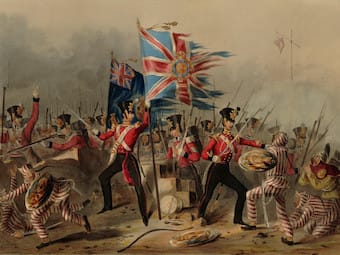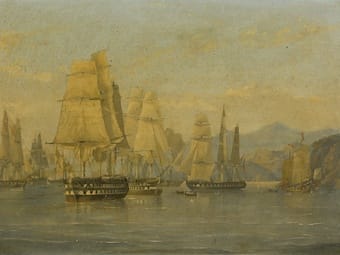HE begged his way to Peking; and had the good fortune to be able to present a statement of his oppressive grievances to the Emperor himself. The venerable monarch perused the contents: the Viceroy of Nankin happened to be in attendance: he was charged with the crime; his confusion betrayed his guilt; and punishment became indispensable. The Emperor, after expatiating on the magnitude of the crime, commanded his head to be brought on the point of a sabre.
The poor merchant was struck dumb with fear and wonder; when the Emperor relieved him by the following address: “Contemplate this aweful example before your eyes; and as I appoint you Viceroy of the province of Nankin, let the fate of your predecessor teach you justice and moderation.”
Questions for Critics
1. What is the author aiming to achieve in writing this?
2. Note any words, devices or turns of phrase that strike you. How do they help the author communicate his ideas more effectively?
3. What impression does this passage make on you? How might you put that impression into words?
Based on The English Critic (1939) by NL Clay, drawing on The New Criticism: A Lecture Delivered at Columbia University, March 9, 1910, by J. E. Spingarn, Professor of Comparative Literature in Columbia University, USA.
Précis
The merchant made his way to Peking, and at the Emperor’s bidding accused the Viceroy to his face of his wrongdoing. The Emperor saw guilt in the Viceroy’s eyes, and had him summarily executed. Then the Emperor turned to the merchant and appointed him Viceroy in the dead man’s place, reminding him of the fatal consequences of any malpractice. (59 / 60 words)
The merchant made his way to Peking, and at the Emperor’s bidding accused the Viceroy to his face of his wrongdoing. The Emperor saw guilt in the Viceroy’s eyes, and had him summarily executed. Then the Emperor turned to the merchant and appointed him Viceroy in the dead man’s place, reminding him of the fatal consequences of any malpractice.
Edit | Reset
Variations: 1.increase the length of this precis to exactly 65 words. 2.reduce the length of this precis to exactly 55 words. 3.introduce one of the following words into the precis: although, because, besides, if, must, unless, whereas, whether.
Archive
Find this and neighbouring posts in The Archive
Find this post and others dated 1796 in The Tale of Years
Tags: History of China (7) Aeneas Anderson (1) China (7) History (957) British History (494) Georgian Era (227) Modern History (343)
Word Games
Jigsaws Based on this passage
Express the ideas below in a single sentence, using different words as much as possible. Do not be satisfied with the first answer you think of; think of several, and choose the best.
The merchant told the Emperor his money had been stolen. He said the Viceroy had taken it. The Viceroy was there.
Variation: Try rewriting your sentence so that it uses one or more of these words: 1. Accuse 2. Face 3. Stand
Spinners Find in Think and Speak
For each group of words, compose a sentence that uses all three. You can use any form of the word: for example, cat → cats, go → went, or quick → quickly, though neigh → neighbour is stretching it a bit.
This exercise uses words found in the accompanying passage.
1 Beg. Emperor. Vile.
2 Before. Representative. Shall.
3 Charge. Eye. Foot.
Variations: 1. include direct and indirect speech 2. include one or more of these words: although, because, despite, either/or, if, unless, until, when, whether, which, who 3. use negatives (not, isn’t, neither/nor, never, nobody etc.)
Subject and Object Find in Think and Speak
Use each word below in two sentences, first as the subject of a verb, and then as the object of a verb. It doesn’t have to be the same verb: some verbs can’t be paired with an object (e.g. arrive, happen), so watch out for these.
This exercise uses words found in the accompanying passage.
1. Following. 2. Way. 3. Divide. 4. Son. 5. Look. 6. Point. 7. Representative. 8. Army. 9. Work.
Variations: 1.use your noun in the plural (e.g. cat → cats), if possible. 2.give one of your sentences a future aspect (e.g. will, going to). 3.write sentences using negatives such as not, neither, nobody and never.
Add Vowels Find in Think and Speak
Make words by adding vowels to each group of consonants below. You may add as many vowels as you like before, between or after the consonants, but you may not add any consonants or change the order of those you have been given. See if you can beat our target of common words.
wry (4)
See Words
awry. wary. weary. wiry.
Post Box : Ask Nicholas
Grok : Ask Grok
You are welcome to share your creativity with me, or ask for help with any of the exercises on Clay Lane. Write to me at this address:
See more at Post Box.
If you like what I’m doing here on Clay Lane, from time to time you could buy me a coffee.
Buy Me a Coffee is a crowdfunding website, used by over a million people. It is designed to help content creators like me make a living from their work. ‘Buy Me a Coffee’ prides itself on its security, and there is no need to register.
Related Posts
In 1840, Secretary at War Thomas Macaulay treated the Union Jack like a bully’s visiting card, but backbencher William Gladstone believed it deserved better.
Picture: By Michael Angelo Hayes (1820-1877), via Wikimedia Commons. Licence: Public domain. . Source.
Posted June 13 2021
Following a historic embassy in 1792-93, Chien Lung, the Emperor of China, despatched a haughty letter rebuffing King George III’s offer of trade.
Picture: By Giuseppe Castiglione (1688-1766), via Wikimedia Commons. Public domain.. Source.
Posted September 6 2020
On his travels through China and Tibet, Roman Catholic missionary Évariste Huc came across a novel way of telling the time.
Picture: By Su Hanchen (12th century), via the National Palace Museum (Taipei and Taibao, Taiwan) and Wikimedia Commons. Licence: Public domain.. Source.
Posted May 26 2018






